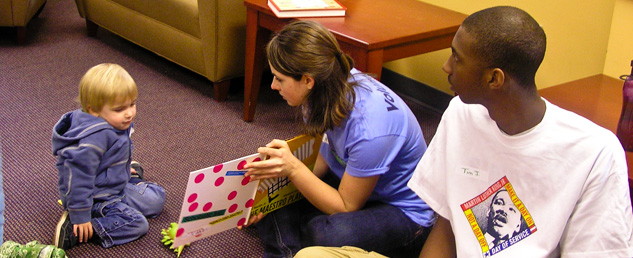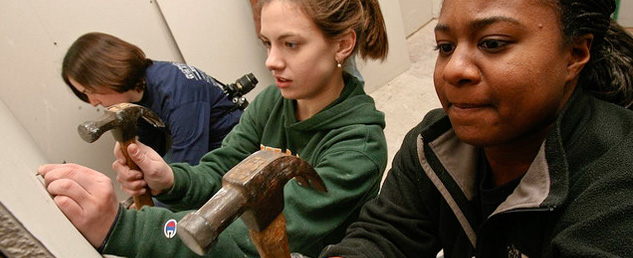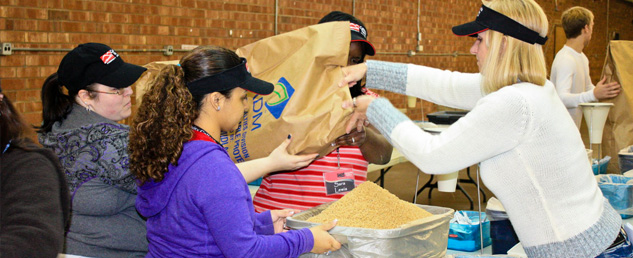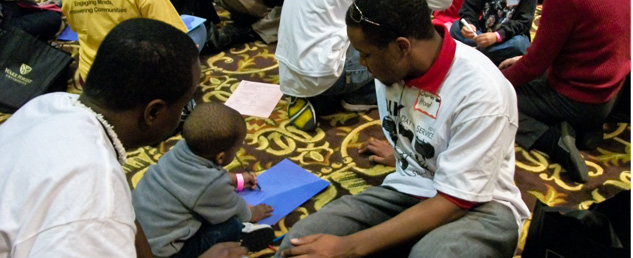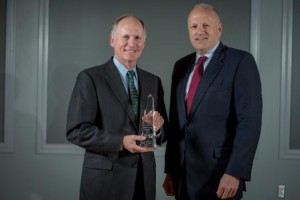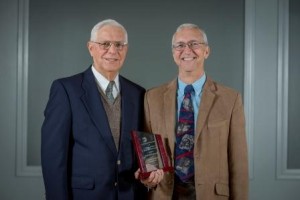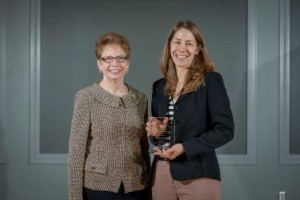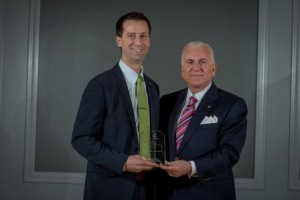North Carolina Campus Compact has named the recipients of its annual community engagement awards, recognizing one university chancellor, one faculty member, and two campus administrators in the state.
UNC Charlotte Chancellor Philip L. Dubois won the Leo M. Lambert Engaged Leader Award, honoring an engaged college or university president or chancellor. UNC Charlotte Professor Jim Cook received the Robert L. Sigmon Award for outstanding achievements in service-learning teaching and community impact. Two administrators – UNC Greensboro’s Dr. Emily Janke and High Point University’s Reverend Joseph Blosser – were recognized for building strong community engagement programs.
The awards were presented at the Compact’s annual PACE Conference (Pathways to Achieving Civic Engagement), held at UNC Wilmington on February 5th. The conference drew nearly 300 faculty, staff, and administrators – including 15 college and university presidents – as part of a two-day event exploring research and best practices in higher education community engagement. The awards were presented by Appalachian State University Chancellor Kenneth Peacock, who chairs the organization’s executive board.
The Leo M. Lambert Award goes to one college or university leader in the state who is committed to creating and sustaining efforts that deeply impact community and campus. Fellow presidents and chancellorsnominate and select the Lambert winner. Chancellor Dubois became the third winner of the award, named for ElonUniversity President Leo Lambert. Previous honorees are Chancellor Linda Brady (2012) of UNC Greensboro and Chancellor Harold Martin (2013) of NC A&T State University.
Since becoming the fourth UNC Charlotte chancellor in 2005, Dubois has overseen dramatic growth in enrollment, capital construction and academic programs. Moreover, he has worked to ensure the university acts on its mission to address “the cultural, economic, educational, environmental, health, and social needs of the greater Charlotte region.”
Fellow chancellors praise Dubois’s commitment to helping UNC Charlotte become a driver of economic and workforce development. The chancellor helped establish new university/industry partnerships like the Energy Production and Infrastructure Center (EPIC), created to meet a growing demand for power engineers. He has overseen creation of a new, interdisciplinary program to offer research and training in Data Science and Business Analytics (DSBA) and the re-launch of the university’s business incubator, Ventureprise. Dubois has worked to physically connect the university to the city, opening UNC Charlotte Center City and building support for the expansion of the region’s light rail system.
Dubois has also supported the university’s community development activities. He has championed UNC Charlotte’s “Governor’s Village” partnership with four Charlotte Mecklenburg schools that serve large numbers of economically disadvantaged students, and he supported the creation of a unique work-study program for military veterans. Over the past year, Dubois visited communities throughout the region for “county days,” meeting with civic, business, and educational leaders to share ideas and gather feedback to inform the university’s continued engagement.
UNC Charlotte Professor Jim Cook was honored with the Compact’s Robert L. Sigmon Award for achievements in community-engaged teaching and impact. The annual Sigmon Award recognizes one faculty member in the state for significant contributions to the practice of service-learning, a pedagogical strategy that links community service to classroom study and reflection. NC native Robert Sigmon, for whom the award is named, pioneered the approach in the 1970s.
Over his 30 years at UNC Charlotte, Cook has led the creation and evaluation of projects and partnerships that meet Charlotte’s most pressing human needs, secured millions of do
llars in grant funding to support these projects, and trained students to be both system-wide change agents and skilled individual practitioners. Cook helped found Mecklenburg County’s Homeless Services Network; led the evaluation and improvement of the MeckCARES partnership among local child-services agencies; and led a HUD-funded effort that resulted in the creation of the Community Development Academy, which increased the university’s support for low-income neighborhoods and families. Scores of students worked as volunteers, interns and researchers to support these and other community-based projects.
Additionally, Cook has helped develop a Ph.D. program in health psychology, a community psychology M.A. program, and a community psychology learning community for undergraduates. A former student, who now heads the program evaluation group at the Yale School of Medicine, says: “In 2 short years I completed a class requirement with a community agency, was on the board of directors at another, and became connected to the UNC Urban Institute. . . . I know that Jim provided me with an excellent foundation in community psychology and community-engaged work.”
The Compact also honored two campus administrators, UNC Greensboro’s Dr. Emily Janke, and High Point University’s Dr. Joe Blosser.
Dr. Emily Janke received the network’s Civic Engagement “Sustaining” Professional of the Year. The award recognizes one staff person in the state for efforts to institutionalize a campus-wide vision of service, support the engagement of faculty and students, and form innovative campus-community partnerships. The “Sustainer” designation honors a staff person with 5 or more years of professional work in the field.
Since coming to UNCG in 2008, Janke has spearheaded efforts to understand the scale and deepen the impact of the university’s community engagement. Now the director of UNCG’s Institute for Community and Economic and Engagement (ICEE) and an associate professor of peace and conflict studies, Janke has led professional development for faculty and students on topics related to community partnerships, chaired the university’s engagement advisory committee, promoted the recognition of community engagement in promotion and tenure decisions, and chaired two UNC system task forces to develop and pilot engagement metrics for the 16-campus system. She has also led the design and development of UNCG’s “Collaboratory,” a searchable, online database that collects community-engaged projects and partnerships from all departments and campus units.
In commending Janke’s work, Chancellor Linda Brady called her a “transformational change agent” whose ability to collaborate with others “is key in our operationalizing a comprehensive vision of UNCG as an engaged institution.”
Reverend Joe Blosser was recognized as the Civic Engagement “Emerging Leader” of the Year. The “Emerging Leader” designation honors a staff person with fewer than 5 years of professional work in the field.
Since joining the university in 2011 as the Robert G. Culp, Jr. Director of Service Learning, Blosser has led the rapid expansion of service-learning and engagement opportunities. He secured over $110,000 in funding to support the service learning program, including a Think BIG Award to fund an interdisciplinary, experiential learning project involving 300 students during the 2012 presidential election. Under his direction, course development grants and training for faculty have more than doubled the number of “SL designated” courses and the number of enrolled students in the past two years.
In 2013, Blosser spearheaded the creation of a Bonner Leaders program at HPU to support the experiential learning of low-income and minority students and establish ongoing partnerships with local non-profits. In 2014, he oversaw the integration of community service into the university’s annual MLK Day event, resulting in 400 volunteers working at 13 community sites.
According to a colleague, Blosser’s work is moving HPU’s service-learning program from a curriculum-specific approach “to a more holistic approach that is creating a culture of ethical leadership and service.”
More information about North Carolina Campus Compact’s annual community engagement awards, including past recipients and nomination process, can be found on our Awards page.

